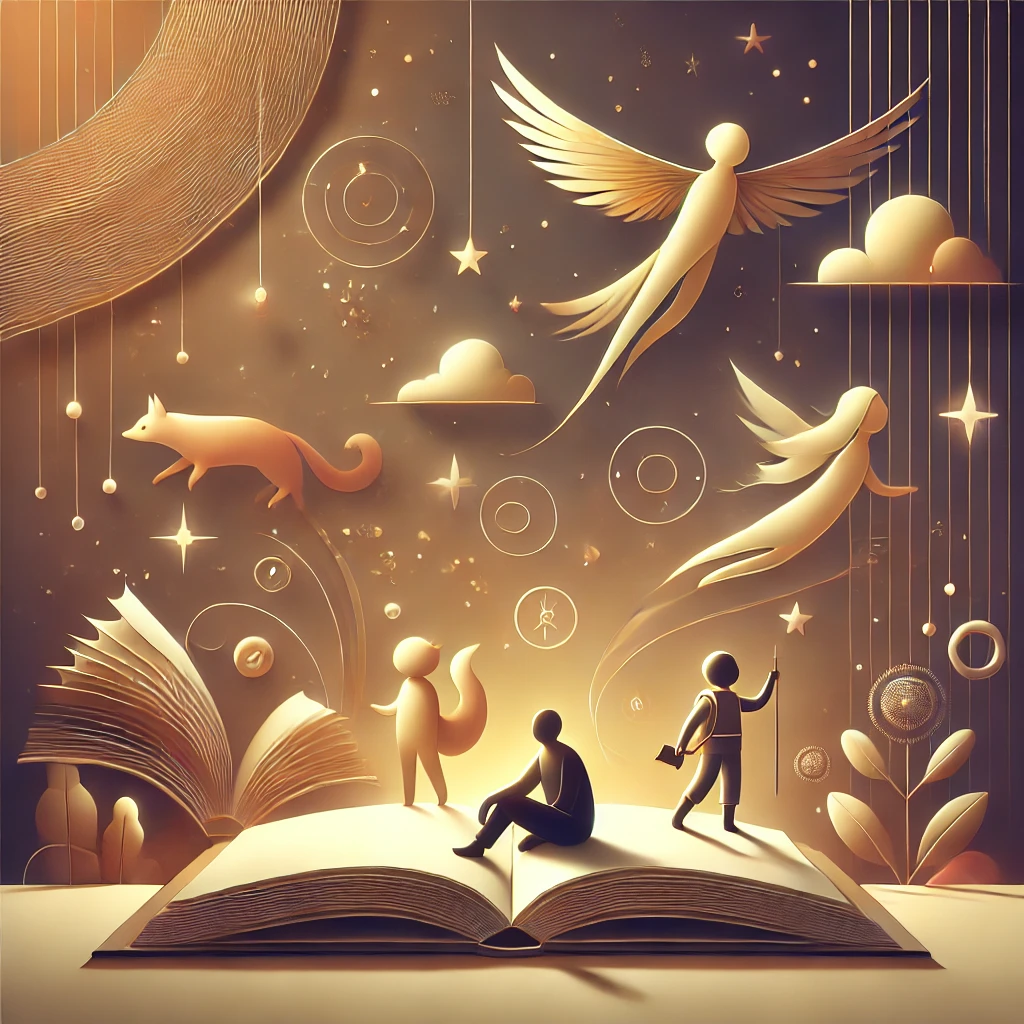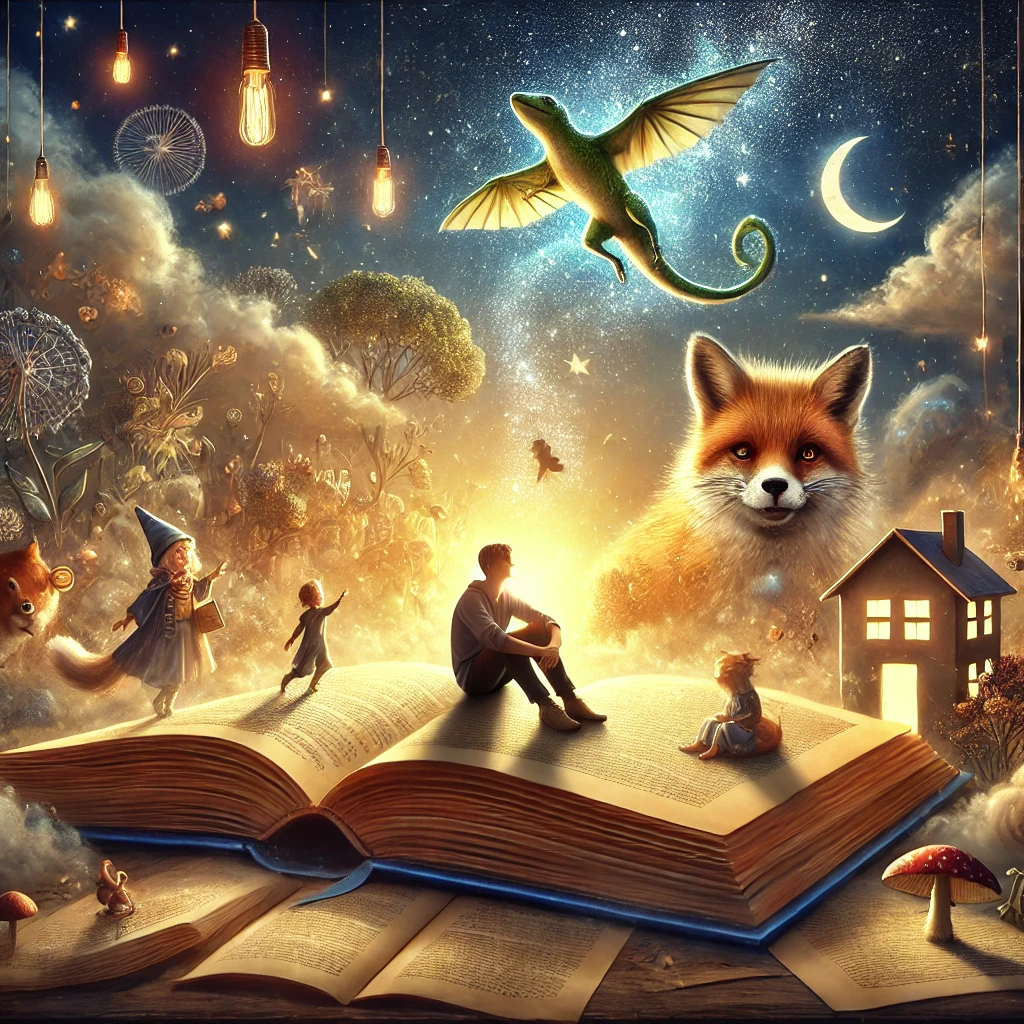
ChatGPT :
Why You Should Read Children’s Books, Even Though You Are So Old and Wise – Katherine Rundell
Katherine Rundell’s essay-turned-book is a passionate and beautifully written argument for why adults should embrace children’s literature. She dismantles the misconception that children’s books are simplistic or merely for entertainment, arguing instead that they offer deep wisdom, boundless imagination, and a necessary counterpoint to adult cynicism. Through literary examples, historical context, and personal insights, Rundell highlights the transformative power of reading stories meant for young audiences.
Introduction: The Stigma Around Children’s Books
Many adults dismiss children’s books as juvenile, associating them with naivety or a lack of complexity. Rundell challenges this assumption, stating that children’s literature often grapples with profound themes—love, loss, courage, injustice—through narratives that are both accessible and deeply moving. She argues that these books provide an unfiltered lens into the human experience, presenting truths in a way that adult literature sometimes overcomplicates or buries under layers of irony and detachment.
She also explores the societal pressure to abandon childhood joys as we grow older. There is an expectation that “serious” readers should consume adult literature, favoring realism, complexity, and even pessimism. However, she insists that returning to children’s books as an adult is not regressive but rather a reclaiming of a vital part of our emotional and intellectual selves.
The Unique Power of Children’s Literature
- A Gateway to Imagination and Creativity
Children’s books invite readers into worlds of wonder, where anything is possible. Unlike much of adult fiction, which often leans on realism, children’s literature embraces magic, adventure, and the extraordinary. This imaginative storytelling fuels creativity, encouraging both children and adults to think beyond the constraints of their daily lives.
Rundell highlights authors like J.M. Barrie (Peter Pan), Lewis Carroll (Alice’s Adventures in Wonderland), and Philip Pullman (His Dark Materials), whose works transport readers to fantastical realms while grappling with existential and philosophical questions.
- Honesty in Storytelling
Children’s books are remarkably direct in their exploration of life’s biggest themes. Death, grief, resilience, love, and moral dilemmas are common topics in classic and modern children’s literature. Books such as Charlotte’s Web by E.B. White and The Secret Garden by Frances Hodgson Burnett teach readers about mortality, transformation, and emotional growth without the pretentiousness sometimes found in adult fiction.
- The Radical Nature of Hope
One of Rundell’s key arguments is that children’s literature insists on hope, even in the face of darkness. Unlike much contemporary adult fiction, which often veers toward bleakness and ambiguity, children’s books champion resilience and the belief that good can triumph over evil.
This is not to say that they are unrealistic. Rather, they acknowledge suffering while offering a vision of courage and possibility. She cites Harry Potter, Anne of Green Gables, and The Little Prince as examples of books that teach readers to navigate hardship without succumbing to despair.
- The Beauty of Simplicity
Children’s books distill complex emotions and ideas into clear, evocative language. The best authors in this genre write with a precision that makes their stories timeless.
Rundell draws attention to Winnie-the-Pooh by A.A. Milne and The Wind in the Willows by Kenneth Grahame as examples of books with deceptively simple language that carry profound emotional and philosophical depth. These books demonstrate that clarity and elegance in storytelling are more powerful than unnecessary complexity.
- Re-Reading with New Eyes
Rereading childhood favorites as an adult offers fresh insights. The stories remain the same, but the reader has changed, bringing new experiences and interpretations to the text. Rundell encourages adults to revisit beloved books and discover the layers of meaning they might have missed as children.
For instance, The Lion, the Witch and the Wardrobe by C.S. Lewis may have been read as a simple adventure in childhood, but as an adult, one might see its deeper allegorical and philosophical elements. Similarly, Matilda by Roald Dahl reveals new layers about intelligence, rebellion, and the importance of kindness when revisited later in life.
The Cultural and Historical Importance of Children’s Books
- Shaping Moral and Ethical Frameworks
Children’s books play a critical role in shaping values and ethics. Stories like To Kill a Mockingbird and The BFG introduce readers to themes of justice, empathy, and standing up against wrongdoing. These lessons stay with us long after childhood, subtly influencing our worldview.
- Challenging Authority and Social Norms
Some of the most impactful children’s books are deeply subversive. Rundell notes that many classic children’s stories challenge authority and societal expectations, encouraging readers to question rules and think independently.
Books like Alice’s Adventures in Wonderland and Pippi Longstocking celebrate defiance and nonconformity, showing children (and adults) that it is okay to push boundaries.
- A Lasting Literary Legacy
Many of the world’s greatest writers and thinkers have been influenced by the children’s books they read. Rundell points out that figures such as C.S. Lewis, J.R.R. Tolkien, and even Einstein spoke about the importance of fairy tales and children’s literature in shaping their understanding of the world.
Key Takeaways
📖 Children’s books are profound: They explore themes of love, loss, courage, and justice in a clear and direct way.
🌎 They offer a fresh perspective: Unlike adult literature, which often leans on realism and cynicism, children’s books insist on wonder and possibility.
💡 Imagination is essential: These books fuel creativity and innovation, encouraging readers to think beyond the constraints of daily life.
🛡️ Hope is a radical act: Children’s literature teaches resilience and optimism, which are crucial in navigating life’s challenges.
❤️ Re-reading childhood books reveals new layers: The stories stay the same, but the reader evolves, bringing new insights to the text.
🎭 Children’s books challenge authority and social norms: Many classic stories celebrate defiance, independence, and critical thinking.
📝 Their language is precise and beautiful: Great children’s books use simple yet poetic writing to convey deep emotions.
🔄 Escapism is valid and necessary: Reading for joy is not a weakness but a source of strength and renewal.
🌟 They shape our moral compass: The books we read as children influence our values and understanding of the world.
🎨 Reading children’s literature as an adult is an act of reclaiming wonder: It allows us to engage with stories that nurture both intellect and emotion.
FAQs:
- What is Katherine Rundell’s main argument in this book?
Rundell argues that children’s books are not just for kids—they contain deep wisdom, imagination, and emotional truths that adults can benefit from. She believes reading them helps reclaim wonder, joy, and a fresh perspective on life.
- Why should adults read children’s books?
Adults should read children’s books because they offer a unique blend of honesty, creativity, and hope. Unlike much of adult literature, which can be cynical or overly complex, children’s books communicate big ideas in a clear, engaging, and often beautiful way.
- Are children’s books too simple for adult readers?
Not at all. While they may use simpler language, the themes and emotions they explore—love, loss, bravery, justice—are universal. Many children’s books contain layers of meaning that become even richer when read as an adult.
- What kinds of themes do children’s books explore?
Children’s literature covers a wide range of themes, including morality, friendship, courage, grief, justice, and imagination. Many stories tackle difficult topics, such as death (Charlotte’s Web), identity (Harry Potter), and personal growth (Anne of Green Gables).
- Does reading children’s books mean escaping reality?
Yes, but in a positive way. Rundell argues that escapism is not a weakness but a source of strength. These books provide comfort, inspiration, and a way to process real-world issues through the lens of storytelling.
- What are some examples of children’s books that are great for adults?
Some books Rundell would likely recommend include The Little Prince by Antoine de Saint-Exupéry, Alice’s Adventures in Wonderland by Lewis Carroll, The Wind in the Willows by Kenneth Grahame, Matilda by Roald Dahl, and The Secret Garden by Frances Hodgson Burnett.
- How does reading children’s books benefit mental well-being?
Children’s books often promote optimism, resilience, and emotional intelligence. They provide a sense of comfort, rekindle a sense of wonder, and remind adults of the importance of play and creativity.
- How do children’s books challenge societal norms?
Many classic and modern children’s books encourage independent thinking and questioning authority. Characters like Pippi Longstocking and Alice (from Alice’s Adventures in Wonderland) defy conventions and embrace their uniqueness, teaching readers to do the same.
- What does the book say about re-reading childhood favorites?
Rundell emphasizes that revisiting books from childhood can be a revelatory experience. As adults, we bring new perspectives and life experiences that allow us to see deeper meanings and nuances in the stories.
- Can reading children’s books make someone a better writer or thinker?
Absolutely. Many great writers and intellectuals have credited children’s books as shaping their creativity and thought processes. Their clarity, brevity, and poetic storytelling provide valuable lessons in effective communication and critical thinking.
*********
Quotes from Why You Should Read Children’s Books, Even Though You Are So Old and Wise
📖 “Children’s books are not a hiding place, they are a seeking place.”
→ Rundell argues that children’s literature isn’t about escapism in a negative sense—it’s about searching for truth, hope, and wisdom.
🌟 “When you read children’s books, you are given the space to read again as a child: to find your way back to wonder and joy.”
→ She emphasizes that children’s books allow adults to reconnect with a sense of adventure and optimism.
💡 “Hope is a form of resistance.”
→ Unlike much of adult literature, which often leans toward cynicism, children’s books insist on hope as a radical and necessary force.
🛡 “Children’s fiction necessitates distillation: at its best, it renders the most complex of human emotions into their clearest, purest forms.”
→ Rundell highlights how children’s literature simplifies—but does not diminish—deep emotional truths.
🎭 “A good children’s book tells the truth—not the whole truth, but the truth.”
→ She suggests that children’s books are often more honest than adult books because they strip away unnecessary complications.
📚 “Adults who read children’s books are not retreating; they are advancing.”
→ Reading children’s literature as an adult is not a sign of immaturity but an act of intellectual and emotional enrichment.
💭 “The best children’s books say: look, this is what bravery looks like. This is what generosity looks like. They create maps for our minds and souls.”
→ Children’s stories shape our values, teaching courage, kindness, and resilience.
🎨 “Imagination is not an indulgence, it is a necessity.”
→ Rundell defends creativity as essential for both children and adults.
📜 “Fairy tales are about trouble, and trouble can teach us more than ease.”
→ Many children’s books tackle hardship, preparing readers—young and old—for real-life challenges.
🔄 “Rereading is a way to measure who you have become.”
→ She encourages revisiting childhood books to see how personal growth changes the way we interpret stories.

